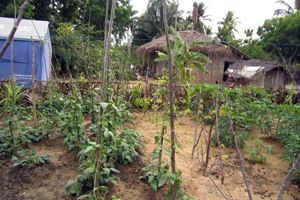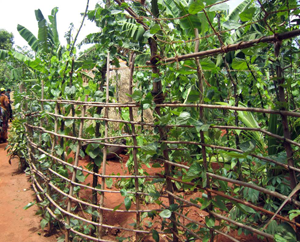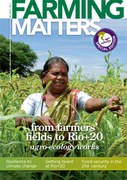Food security remains a major challenge in Sri Lanka, particularly in the northern region which has been ravaged by the long civil war. In 2007, the national government initiated a campaign called Api wawamu rata nagamu (“Let’s grow and build the country”) to promote the adoption of home gardens, already a tested and effective approach.

Home gardening is an age-old practice in Sri Lanka. Nowadays, these home gardens help to improve food and nutritional security and livelihoods in many different ways.
Home gardens and livestock production provide easy access to food throughout the year at a fraction of the cost it takes to purchase them from the local market. They increase household’s access to a diverse array of food stocks, including fresh vegetables, fruits, roots and tuber crops, and livestock products.
In addition, some participating families have managed to start a domestic enterprise by selling their surplus produce.

In addition to these core benefits, home gardens have other advantages. They demand fewer resources than commercial agriculture, they can be easily managed and have higher energy efficiency rates.
The productivity of home gardens can be systematically increased through eco-friendly practices which also reduce some health and environmental issues commonly experienced in the northern region.
Good household waste management can convert kitchen waste and animal manure into organic fertilizers and mulch for the home garden. Simple Integrated Pest Management (IPM) practices such as incorporating flowering plants, medicinal plants and herbs and diversifying crops, help to reduce pest and disease infestations, to conserve biodiversity and natural enemies and enhance ecosystem services.
The north of Sri Lanka has a long dry season and many marginal lands. The integration of organic material will increase nutrient levels and enrich soil quality and moisture. Simple technologies like “vertical gardening” have made home gardening possible both in urban and rural areas where there is a shortage of land. In the long run, such environmentally sound practices will not only result in sustainable food production, but also strengthen a number of ecosystem services.
The home garden initiative also aims to strengthen local communities and help build peaceful communities. The long civil war was very detrimental to the welfare of the people in the north and home gardens may offer a viable platform to institute solidarity, social justice and equity, especially for the disadvantaged and vulnerable sections of the population.
Text: Dilrukshi Hashini Galhena, Gunasingham Mikunthan and Karim Maredia
D. Hashini Galhena Dissanayake is a Graduate Research Assistant (Food Production and Food Security) at the Department of Crop and Soil Sciences, Michigan State University, U.S.A. E-mail: galhenad@msu.edu.
Gunasingham Mikunthan works as Professor and Head of Agricultural Biology, Faculty of Agriculture, University of Jaffna, Jaffna, Sri Lanka.
Karim M. Maredia is Professor and Director of the World Technology Access Program (WorldTAP), College of Agriculture and Natural Resources Michigan State University, U.S.A.

